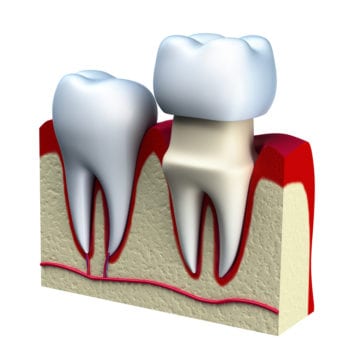If you’ve been suggested a dental crown, you may be curious about them. What are they made of? What do they do? How much do they cost? If you’ve never had a crown before, you may be put off by the idea of replacing your tooth with a prosthetic, but the truth is that crowns are a successful permanent replacement for damaged teeth.
Drs. Victoria Uryniak and Carson Ferris-Zeolla provide dental crowns at their Walnut Pond dental clinic. Call our office to learn more about crowns, including crown cost, Clinton NJ. Call (908) 200-7007 to make an appointment!
Everything You Need to Know About Crowns
Dental crowns are tooth-shaped caps that surround an encircle a damaged tooth. They restore the full shape of a tooth, and protect the remaining enamel and root from further damage or decay. A crown can be used to restore a tooth that has been badly cracked or broken, or has suffered a deep cavity. After a crown has been bonded to a tooth, it serves as a permanent replacement for the tooth when you bite and chew.
Crowns are often an ideal solution when:
- A tooth has extensive decay and requires a root canal.
- A portion of the tooth has broken off.
- A deep crack threatens the health of the tooth.
Crowns can also be a great solution to teeth with extensive cosmetic damage. For example, if a tooth has been badly chipped or stained, a crown can be used to replace the tooth’s enamel (above the gum line), while protecting the root of the tooth (beneath the gums).
Materials and Appearance
Crowns are designed to flawlessly replace the appearance of a natural tooth, so they always look good in your smile. They are most frequently made from dental ceramic or zirconium. They may also be made of metal, or porcelain that has been fused to a metal base (PFM).
The different materials have different benefits, based on the location of the crown in the mouth, how much tooth is left beneath it, and how it will be used. Children with damage to a tooth are often fitted with a metal crown instead of a filling, as baby teeth cannot always support a filling, which may damage their thinner enamel. When you visit your dentist to learn more about crowns, she will explain the type of crown recommended for your specific needs.
The Crowning Process
When a patient needs a crown, much of the natural enamel must be removed or resurfaced to make room for the crown in your arch of teeth. This process is referred to as treating the tooth, and it must be performed before a dental impression is taken.
When your tooth is ready for a crown, the doctor will:
- Treat the tooth, by removing and resurfacing your enamel.
- Take a dental impression, which will be sent to a dental laboratory.
- Provide a temporary crown to protect the tooth while your crown is fabricated.
When your permanent crown is ready, we will call you for a second appointment, in which the crown will be bonded to your tooth. In the meantime, treat your temporary crown with care. You may eat normally, but try to avoid hard, crunchy foods that may stress the temporary crown. Call us right away and let us know if your temporary crown becomes damaged or dislodged.
Crown Cost, Clinton NJ
On average, a dental crown will cost between $500-3000 per tooth. The cost of your crown may vary significantly, based on the materials used and the other dental services required. For example, a filling and a root canal have their own costs, so if your crown treatment requires one of these treatments, that will add to the cost.
To learn more about crowns, including crown cost, Clinton NJ, call for an appointment at Walnut Pond. Dr. Victoria Uryniak or Dr. Carson Ferris-Zeolla will help you determine whether a crown is an appropriate treatment for your problem tooth. Call us at (908) 200-7007 for an appointment.







